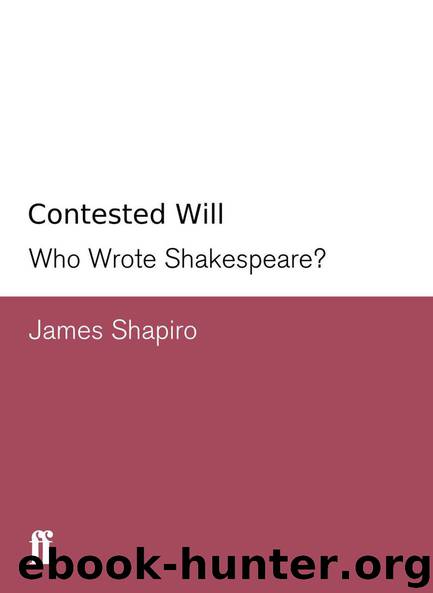Contested Will: Who Wrote Shakespeare? by James Shapiro

Author:James Shapiro
Language: eng
Format: epub, mobi
ISBN: 9780571258697
Publisher: Faber
Published: 2010-03-31T22:00:00+00:00
Like many in his day, Looney believed that so accomplished a writer as Shakespeare could never have stooped to collaborating with lesser playwrights. And there had long been a division between those who believed that Shakespeare mainly wrote for Elizabethan playgoers and those convinced he wrote for posterity; Looney fell into the latter camp, arguing that plays so dense with meaning and allusion had to have been thoroughly overhauled. Such complex works of art could never have been understood by ordinary Elizabethan theatregoers: ‘To pack with weighty significance each syllable of a work meant only to amuse or supply thrills for two or three hours would, moreover, defeat its own ends.’ So Looney felt ‘justified in claiming then that the best of the dramas passed through two distinct phases, being originally stage-plays – doubtless of a high literary quality – which were subsequently transformed into the supreme literature of the nation’. It was an inaccurate and anachronistic notion of Shakespeare’s craft, one more suited to Henry James’s revisions in his New York Edition than to a collaborative Jacobean playwright.
Armed with such assumptions, Looney established a profile that everyone could agree defined the writer of such remarkable plays and sonnets: a recognised genius as well as a talented poet, a man who was also mysterious, eccentric and well educated. Building on this foundation, Looney appended a more controversial list of traits: whoever wrote the plays was necessarily a man with feudal connections, an aristocrat, a lover of falconry and music, an enthusiast about Italy, improvident in money matters and conflicted in his attitude toward women. The author also had Catholic sympathies and was fundamentally sceptical (here citing Comte as his authority, who had labelled Shakespeare ‘a sceptic’).
Looney still insists – and it’s hard not to believe him – that he had as yet no specific candidate or slate of potential candidates in mind. So he began at the beginning, with what ‘Shakespeare’ himself had called ‘the first heir of my invention’: Venus and Adonis. With this poem in hand, he sought a match in the most popular poetry anthology of the day, Palgrave’s Golden Treasury of English Songs and Lyrics. He soon found a poem written in the same stanzaic form. Its author was Edward de Vere, seventeenth Earl of Oxford, of whom Looney knew next to nothing. He quickly set about making up for that ignorance, learning everything he could about Oxford’s life and work. Looney recalls his growing excitement as every biographical fact and casual reference he uncovered about Oxford – and there wasn’t much published material to go on at that time – confirmed not only that he perfectly fitted every established criterion with which he had begun his search, but also that Oxford’s life and outlook perfectly corresponded with what was in the plays.
Only a churlish reader would stop to wonder why Looney didn’t cast his net further, compare Venus and Adonis to the works of other poets writing in similar stanzaic forms, look at Shakespeare’s early plays as well as poetry, or consider the possibility that the plays were written collaboratively.
Download
Contested Will: Who Wrote Shakespeare? by James Shapiro.mobi
This site does not store any files on its server. We only index and link to content provided by other sites. Please contact the content providers to delete copyright contents if any and email us, we'll remove relevant links or contents immediately.
4 3 2 1: A Novel by Paul Auster(12358)
The handmaid's tale by Margaret Atwood(7734)
Giovanni's Room by James Baldwin(7307)
Asking the Right Questions: A Guide to Critical Thinking by M. Neil Browne & Stuart M. Keeley(5743)
Big Magic: Creative Living Beyond Fear by Elizabeth Gilbert(5730)
Ego Is the Enemy by Ryan Holiday(5396)
The Body: A Guide for Occupants by Bill Bryson(5067)
On Writing A Memoir of the Craft by Stephen King(4921)
Ken Follett - World without end by Ken Follett(4709)
Adulting by Kelly Williams Brown(4556)
Bluets by Maggie Nelson(4536)
Eat That Frog! by Brian Tracy(4503)
Guilty Pleasures by Laurell K Hamilton(4428)
The Poetry of Pablo Neruda by Pablo Neruda(4082)
Alive: The Story of the Andes Survivors by Piers Paul Read(4013)
White Noise - A Novel by Don DeLillo(3993)
Fingerprints of the Gods by Graham Hancock(3980)
The Book of Joy by Dalai Lama(3963)
The Bookshop by Penelope Fitzgerald(3829)
